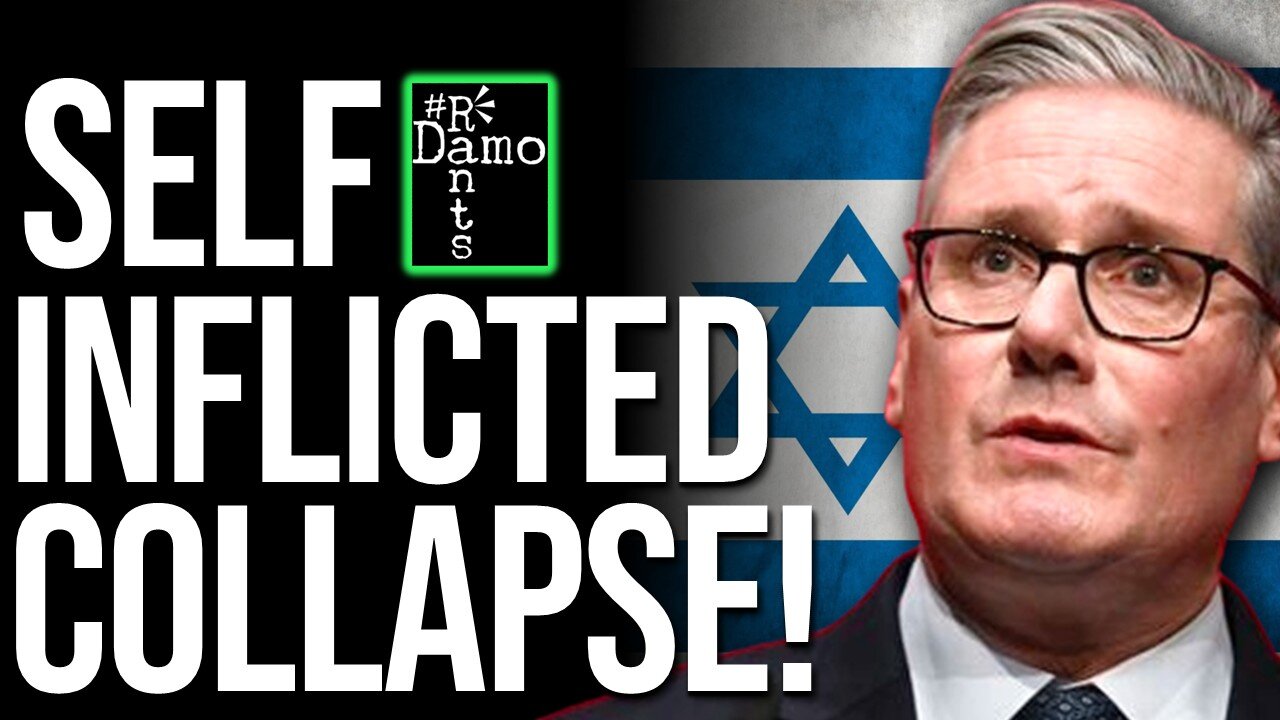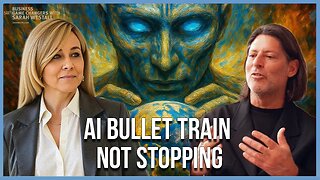Premium Only Content

Starmer Tried to Protect Israel’s Image — And Destroyed His Own Instead
Right, so it takes a special kind of government to look at hundreds of pensioners and priests being hauled off by riot police and decide the real problem is that they’re still allowed to come back next week. But that’s Keir Starmer’s Britain now apparently: a place where dissent is an administrative inconvenience, where the right to protest is treated like a parking permit, and where empathy has been weaponised into a form of crowd control. Shabana Mahmood calls it “balance.” The Home Office calls it “public safety.” Everyone else can see it for what it is though – another authoritarian crackdown dressed up as moderation, weaponising a tragedy in Manchester to excuse it. Britain now has a Labour government expanding Tory laws to stop people saying the wrong thing too often, and doing it in the name of protecting those it will inevitably put in more danger in so doing. Who voted for that?
Right, so yesterday, the Metropolitan Police detained some 492 people at the latest pro-Palestine demonstration in London organised under the Defend Our Juries campaign. Four hundred and eighty-eight of those arrested were accused of supporting the proscribed organisation, Palestine Action of course, more grannies, more disabled people holding bits of cardboard arrested in scenes that exemplify the damage being done to civil society and our right to protest, arrests being made following months of protests and arrests, of the same people in some cases, related to Israel’s assault on Gaza and Britain’s ongoing role in arms exports to the Israeli military.
The demonstration was as ever largely peaceful. It included elderly campaigners, clergy, students and legal observers. Among those arrested once more was Reverend Sue Parfitt, the 83-year-old retired Anglican priest, who sat holding a banner reading “I oppose genocide. I support Palestine Action.” Police officers lifted her from her chair and placed her under arrest. When asked why a priest in her eighties was being detained, we were told that “the law doesn’t have an age limit.”
And so here we are now, the next day and Home Secretary Shabana Mahmood has announced that the government would introduce additional powers for police to control “repeat protests.” Senior officers, she said, would be authorised to consider the “cumulative impact” of previous demonstrations when deciding whether to impose conditions or relocate an event. She argued that such measures were necessary because repeated large-scale protests “can leave sections of our country, particularly religious communities, feeling unsafe.” She cited “considerable fear within the Jewish community” as justification for the change. Weaponising religion to clamp down on our right to protest, weaponising the incident in Manchester this week to clamp down on our right to protest, the attack on a Mosque in East Sussex on Saturday night barely warranting a mention beyond in comparison though.
This announcement represents a decisive moment for civil liberties in the United Kingdom. It extends the protest restrictions introduced under the Conservatives and signals that this Labour in name only government intends not just to retain, but now expand Tory powers first created under the Police, Crime, Sentencing and Courts Act 2022 and the Public Order Act 2023. Those laws criminalised disruption, broadened police discretion, and made pre-emptive arrests easier. Labour has left those frameworks intact.
The new measures follow the same trajectory that began under Priti Patel and Suella Braverman, who pushed through successive pieces of legislation widening police authority. Their language was direct: protesters were labelled “mobs” and “eco-zealots.” The difference under Labour is stylistic. Starmer and Mahmood frame similar policies as administrative “balance.” The substance, however, is unchanged.
Under the previous acts, police could already impose conditions if a protest was considered “seriously disruptive.” What Mahmood now proposes is a cumulative test — protests may be restricted or moved even if each individual event remains peaceful, simply because a pattern of regularity exists. How dare we keep protesting about something the government refuses to engage with. How dare we inconvenience them. In effect, consistency becomes a criterion for control.
Human-rights organisations, including Liberty and Amnesty International UK, have long warned that these laws undermine the right to peaceful assembly protected by Article 11 of the European Convention on Human Rights. The “cumulative impact” clause takes the erosion further, introducing pre-emptive reasoning and lowering the threshold for interference. It also transfers significant discretion to senior officers without transparent oversight.
The result is the normalisation of state management of dissent. Protest, historically treated as a right, is now being re-categorised as an administrative issue that can be relocated or reduced to convenience.
And the political context of Mahmood’s announcement is essential to this story, because its what gave the government their opportunity here. Two days before the London arrests, a gunman attacked a synagogue in Manchester as I’ve covered in other videos. In the aftermath of that though, news agencies began linking that tragedy directly to the upcoming London protests, implying a climate of tension between British Jews and pro-Palestine demonstrators. Starmer stated that protests should “respect the grief of British Jews.” So this framing blurred the distinction between a criminal act of terror and peaceful political expression in two events that are actually completely separate and distinct from each other, to weaponise one to clamp down on the other.
The government’s use of this linkage marks a shift from policing actions to policing emotions. The justification for limiting protest is no longer public safety in the practical sense — it is emotional comfort. This sets a dangerous precedent because it defines rights not by legality but by perceived sensitivity. They would rather strip people’s rights away than stop supporting Israel’s genocide. It also places Jewish citizens in an impossible position: their legitimate concerns are being used to curtail other people’s freedoms, creating the impression of collective responsibility.
Jewish Voice for Liberation, formerly called Jewish Voice for Labour, but they don’t want to be associated with Starmer’s regime anymore and who can blame them? An organisation representing Jewish members of society, criticised this approach. In its statement “Labour’s Defence of Authoritarianism – a Danger to Us All,” it argued that invoking Jewish safety to rationalise restrictions “endangers Jewish people by reinforcing antisemitic tropes.” Many Jewish campaigners have continued to join pro-Palestine marches, rejecting the idea that security can be achieved through suppression.
By reducing complex social realities to a single narrative of fear, the government risks inflaming tensions rather than easing them.
The optics of appointing a Muslim Home Secretary to front this policy have been politically useful for Labour. Mahmood’s involvement allows the government to present the crackdown as balanced rather than biased. Yet her statements have already been used by sections of the press to frame the issue as an intra-communal dispute between Muslims and Jews. This plays directly into the culture-war narratives that have dominated British media for far too long already.
The government’s claim that it is acting “for community safety” conceals the fact that the measures are aimed overwhelmingly at movements that include a high proportion of British Muslims. It also risks fuelling Islamophobia by reinforcing associations between Muslim identity, protest, and public disorder. The same framing that purports to protect Jews could therefore result in greater hostility toward Muslims, as right-wing media outlets use Labour’s policy to legitimise long-standing stereotypes about extremism and public threat, especially given the conflation with the incident in Manchester.
But compare all of this to the situations now being seen across southern Europe. Italy, Spain and Portugal have seen large demonstrations against Israel’s conduct in Gaza, especially in light of the seizure of the Global Sumud Flotilla and nearly 500 people on board those vessels and their own governments’ complicity in that, especially when it comes to Italy and Spain who sent warships to the flotilla, who then did nothing as Israel struck. In Italy, unions called a general strike across more than one hundred cities. In Rome, organisers claimed around one million participants. Spain witnessed similar marches in Madrid and Barcelona, and Portugal’s capital Lisbon saw its largest protest on foreign policy in years.
Despite Italy being governed by Giorgia Meloni, whose far right party is rooted in post-war neo-fascism, these demonstrations were permitted to proceed. Italy’s constitution, shaped by its experience of fascism, explicitly protects the right to assembly. The same is true of Spain and Portugal, both of which emerged from dictatorship with constitutional safeguards against repression. Britain, by contrast, has no codified constitution and we’re in real trouble now, because the politicians, once seen as too honourable for such a thing to be needed, very much no longer are. Parliament’s sovereignty allows any government with a majority to rewrite the rules governing public expression.
The comparison underlines how far the United Kingdom has diverged from European norms. Where continental states with authoritarian histories now defend the principle of protest, Britain is restricting it.
Under existing legislation, police could impose conditions on a protest if it created an immediate obstruction, excessive noise or danger. The new “cumulative impact” test changes the logic of enforcement. It allows police to act on the basis of prior experience rather than present conduct. This effectively institutionalises collective liability: one group’s actions can justify restrictions on another’s future activity.
In practice, this approach is an attempt to deter continuous campaigning. Environmental groups, trade unions, and anti-racist organisations rely on repetition to maintain momentum. The new powers will make long-term mobilisation more difficult. Affiliated trade unions should be threatening Labour with disaffiliation with immediate effect over this. Employers and universities will face pressure to distance themselves from organisers.
But actually, this has already been happening. This transformation has already begun. Police data shows a significant rise in pre-emptive interventions and arrests under the Public Order Act since its introduction in 2023. The cumulative-impact principle will expand that capacity further, giving law enforcement new grounds to refuse permission or redirect events. The chilling effect on public participation should be obvious.
The central justification for these powers — protecting the public from intimidation — does not hold up under scrutiny. The government has presented anecdotal claims of fear within communities, but no empirical evidence of widespread harm resulting from pro-Palestine demonstrations. Zionists have wailed about it and Starmer and Co jump to their tune and if you don’t think Israel has anything to do with this, and restrictions on protesting in the same place, now euphemistically being called cumulative disruption, ask yourself why this is happening now after Palestine protests and not in the wake of fascists camping outside of that hotel in Epping day after day getting the rocks off terrorising asylum seekers. Starmer somehow always ends up legitimising the far right as he jumps to the Israel Lobby’s tune.
The reality is that the government’s actions protect political authority rather than public safety. Protests have become a visible embarrassment for a leadership that has sought to maintain alignment with Israel while managing domestic discontent. By restricting demonstrations, Labour shields itself from sustained moral and media pressure. The protests have Starmer rattled, he hates it and he’s lashing out.
The decision to pursue additional restrictions reflects a political strategy rather than a security necessity. Starmer’s leadership is defined by a desire to appear stable and conservative on matters of law and order. The calculation is that demonstrating toughness toward protesters neutralises attacks from the right-wing press and reassures the business and security establishment.
However, this approach carries serious reputational risks. Civil-liberties lawyers, human-rights groups and a number of Labour MPs have already described the policy as disproportionate and counter-productive. Liberty called it “an unlawful assault on the right to protest.” Former senior judges have questioned whether it is compatible with the European Convention on Human Rights. Trade unions and grassroots organisations have begun coordinating legal challenges.
The backlash highlights the limits of Starmer’s strategy as well. What was intended to project authority is instead reinforcing the perception of authoritarian drift. Internationally, Britain’s image as a defender of democratic norms is deteriorating, so much for the Mother of all Parliaments.
Both Jewish and Muslim communities are likely to be harmed by the policy, not protected by it, the only ones who will be pleased are Zionists. Jewish citizens who oppose Israel’s actions find themselves implicated in government decisions they do not support. Pro-Palestine Jews have expressed concern that being portrayed as beneficiaries of repression will fuel antisemitic resentment, which are surely going to drive more incidents like Manchester, not fewer?
For Muslims, the consequences are immediate. Increased police scrutiny and media hostility risk deepening social division. The presence of a Muslim Home Secretary does not offset this effect; it may even intensify it by allowing the government to deny discrimination while enforcing policies that disproportionately affect Muslims and of course Mahmood herself once upon a time very much believed in protest, it would seem. Selling out to climb the greasy pole of power, she should learn the lessons of Angela Rayner I daresay.
But the result is a policy that undermines inter-communal trust and strengthens far-right narratives of conflict between minorities.
The British mainstream media has of course played a central role in shaping public perceptions on such matters. Right wing outlets such as the Daily Mail, The Times and major broadcasters have consistently framed protests as disruptive rather than democratic. By linking demonstrations to terrorism or community tension, they create a moral justification for stronger policing, rather than the visible exercising of our right to freedom of expression and right to protest.
This feedback loop benefits both the government and the press. Ministers can point to media coverage to defend their actions; editors gain audience engagement from stories of confrontation. The effect is to narrow the boundaries of acceptable dissent.
It takes little effort to expose the shameless opportunism on show though, when you consider 13 Britons are currently held by Israel having been taking part in the Sumud Flotilla, but there’s been no mention, let alone condemnation of that, because of course its Israel.
But when various outlets chose to place the Manchester attack and the London arrests within the same narrative frame, it illustrated how easily context can be manipulated. The emotional impact of violence is used to delegitimise peaceful opposition, despite the two events having no connection with each other at all.
Britain’s constitutional framework lacks the safeguards found in other democracies. Parliamentary sovereignty allows the executive to pass far-reaching laws with minimal judicial oversight. The courts, citing deference to Parliament, rarely intervene. This has created a feedback mechanism where each expansion of policing power sets a new baseline for the next.
The “cumulative impact” principle exemplifies this trend. It is legally vague, open to interpretation, and difficult to challenge in court. Once implemented, it will likely become standard practice for managing dissent. The absence of codified rights means that the burden of proof rests on citizens rather than the state.
This incremental process explains why the United Kingdom, despite its democratic traditions, now ranks lower than several European states on measures of civic freedom.
The irony is that countries with authoritarian pasts have built stronger democratic defences than Britain, which never experienced occupation or regime change. The erosion now visible in London is therefore self-inflicted and the massive amounts of apathy in the country have given space for it to happen.
The long-term consequence of these measures is an erosion of trust between citizens and institutions. When law enforcement becomes an instrument of political messaging, it loses public confidence. When protest is treated as disruption, citizens disengage from formal politics altogether.
The government’s insistence that the measures “balance rights” disguises their real effect: they shift power further toward the executive and away from civic society. The state’s growing ability to determine when and how people may express opposition is incompatible with a functioning democracy.
Domestically, the backlash is growing though. Labour backbenchers have warned that the crackdown could alienate younger voters and civil-society allies. Rights groups are preparing coordinated legal actions, and campaign networks are linking the issue to wider questions about surveillance and political policing.
As for political pushback on it, the Green’s have thusfar been the only ones I’ve seen to attack this.
Zack Polanski hit the nail on the head when he called it out saying:
‘This is grim & dangerous over reach. This is a government that have lost the moral argument & are still selling arms to Israel. Now further cracking down on dissent. Absolutely the opposite of what they should be doing - so of course this is what the Labour Government choose.’
The strategy designed to protect Starmer’s authority now threatens to define his premiership as repressive and short-sighted.
The expansion of protest restrictions under Keir Starmer’s government represents the most serious challenge to civil liberties in the United Kingdom in a generation. It extends the authoritarian framework created by previous Conservative administrations and embeds it within the politics of moderation.
By justifying repression through the language of safety and community fear, the government risks inflaming the very tensions it claims to reduce. The policy undermines Jewish and Muslim communities alike, damages Britain’s international reputation, and weakens public trust in democratic institutions.
The principle at stake is straightforward. The right to peaceful protest is a cornerstone of any democratic society. Once eroded, it is rarely restored. The question now confronting Britain is whether a government elected to end Conservative authoritarianism intends instead to entrench it.
The outcome of the coming months — the legal challenges, the parliamentary debates, and the public response — will determine whether protest in Britain remains a right or becomes a regulated privilege.
For more on the latest on the Manchester attack and the actual events and what transpired there, please do check out this video recommendation here as your suggested next watch.
Please do also hit like, share and subscribe if you haven’t done so already so as to ensure you don’t miss out on all new daily content as well as spreading the word and helping to support the channel at the same time which is very much appreciated, holding power to account for ordinary working class people and I will hopefully catch you on the next vid. Cheers folks.
-
 19:54
19:54
Forrest Galante
7 hours agoPrivate Tour Of America's Best Marine Animal Facility
8.31K6 -
 9:25
9:25
MattMorseTV
1 day ago $8.44 earnedSupreme Court just DROPPED a NUKE.
12.1K50 -
 13:25
13:25
Nikko Ortiz
1 day agoWorst Karen TikTok Fails
9.44K10 -
 40:24
40:24
The Connect: With Johnny Mitchell
2 days ago $18.41 earnedInside The WORST Drug-Infested Slums Of Medellin, Colombia
56.6K29 -
 4:14
4:14
GritsGG
14 hours ago2 Warzone Easter Eggs! How to Find Them EASILY!
4.8K -
 LIVE
LIVE
Lofi Girl
2 years agoSynthwave Radio 🌌 - beats to chill/game to
239 watching -
 1:45:43
1:45:43
Man in America
14 hours agoThe DISTURBING Truth About Parasites — Live Q&A w/ Dr. Jason Dean
71.1K38 -
 7:13:47
7:13:47
SpartakusLIVE
10 hours ago#1 Mountain of Muscle with HUGE Legs saves your weekend from complete BOREDOMNight HYPE
42.3K1 -
 47:42
47:42
Sarah Westall
11 hours agoFreedom or Slavery? AI will Change Everything w/ Trump Senior Advisor Marc Beckman
56.7K12 -
 2:23:20
2:23:20
vivafrei
17 hours agoEp. 285: Visa Revocation No-Go! Sortor Arrested! Ostrich Crisis! 2A Win! Comey Defense & MORE!
115K109
